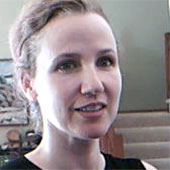6 Tips for Boosting Your Baby's Language Skills
- Tweet

“Talk to your baby.”
“Respond to your infant’s cues.”
We get this advice all the time, but what does it actually mean? Babies benefit when we expose them to lots of language, but it’s not merely a question of word count.
What really seems to matter is the personal connection--being involved in the give-and-take of a genuine conversation. Here is a guide to the best kind of “baby talk”: Evidence-based tips for helping babies reach their full potential.
6 Tips for Boosting Your Baby's Language Skills! Tweet this!1. Take a cue from your baby's curiosity.
Whether your baby is fascinated by your wristwatch, the sprinklers at the park, or the fruit on display at the grocery store, let her curiosity guide your interactions. Researchers have shown that babies learn more from our words when we talk about the things they are looking at, pointing to, or wondering about.
2. Show your baby that you’re “tuned in.”
When we talk with other adults, we show we are listening in a variety of ways. It might be a mere look or a grunt. It might be a verbal reply to the question, “What’s for lunch?” But whatever the medium, the message is the same: I’m paying attention, and what I do next depends, in part, on what you do or say.
Babies – even babies who can’t speak yet -- look for the same message from us. They want to know that we will respond contingently to their signals, and when they perceive us doing it, their brains seem to flip a switch. Studies indicate that babies learn language faster when we talk with them, not at them.
3. Be flexible and spontaneous.
It's easy to get bogged down with routines, but when it comes to family communication, we need to be ready to improvise. For instance, if your toddler interrupts your bedtime story because he wants to talk about the chair that Goldilocks smashed, go with it.
Insisting that you stick to the narrative isn’t going to help your child build better verbal skills. On the contrary, it’s likely that kids learn more when the conversation veers off-text. Besides, forced bedtime reading is neither fun nor soothing. Your child might end up having more trouble falling asleep!
4. Supplement verbal messages with expressive emotions, gestures, and movements.
When babies are learning to talk, they don't just listen to our words. They also notice our tone of voice, and pay particular attention when we speak with exaggerated emotion: It helps them figure out our meaning.
Similarly, infants are more likely to “crack the code” when we use instructive movements and gestures to get the point across. For example, researchers find it’s pretty easy to get 8-month-old babies to associate a new toy with its name – if you shake the toy gently while speaking the appropriate word.
5. Don’t worry about being perfect.
Speaking with clear pronunciation and emotional energy is always a good idea, but you don’t need to talk like a polished public speaker to boost your child’s verbal skills. In fact, babies might learn words better from conversation that sounds casual, hesitant, and real. In experiments, young children were more likely to pick up a new word if they heard it spoken by a person who seemed to struggle a bit before getting the word out. Those little stalling sounds we make (“…um...”) seem to make babies pay more attention to what we say.
6. Shake things up.
When we talk with very young children, we tend to edit what we say, making our statements simpler and easier to decipher. So instead of saying "Watch me roll this soccer ball," we are more likely to pare things down to a single word: "Ball!"
It’s a good tactic for babies who are learning their first words. But as children get older, we should be careful about falling into the trap of "talking down." Babies can't expand their vocabularies if they don't encounter new words, so it's important to pepper our speech with more sophisticated language that allows kids to stretch and grow. One good way to do this is by repeating and expanding on what your child says. "You heard the fire truck? The fire truck has a loud siren."
And what if something seems wrong?
Talk with your pediatrician about your concerns, and ask about getting an expert evaluation. If your child is having difficulties, a speech therapist can help get your “slow talker” on track.
References:- Dewar G. 2015. The effects of television on language skills: Does TV really prevent learning? Parenting Science: http://www.parentingscience.com/effects-of-television-on-children-learning-speech.html
- Tamis-LeMonda CS, Kuchirko Y, and Song L. 2014. Why is infant language learning facilitated by parental responsiveness? Current Directions in Psych. Science 23(2) 121-126.
- Begus K, Gliga T, and Southgate V. 2013. Infants learn what they want to learn: Responding to infant pointing leads to superior learning. PLOS One DOI: 10.1371/journal.pone.0108817
- Gros-Louis J, West MJ, and King AP. 2014. Maternal responsiveness and the development of directed vocalizing in social interactions. Infancy 19(4) 385-408.
- Guttentag CL, Landry SH, Williams JM, Baggett KM, Noria CW, Borkowski JG, et al. 2014. "My Baby & Me": effects of an early, comprehensive parenting intervention on at-risk mothers and their children. Dev Psychol. 50(5):1482-96.
- Roseberry S, Hirsh-Pasek K, and Golinkoff R. 2014. Skype Me! Socially Contingent Interactions Help Toddlers Learn Language. Child Dev. 85(3): 956–970.
- Zucker TA, Cabell SQ, Justice LM, Pentimonti JM, and Kaderavek JN. 2013. The role of frequent, interactive prekindergarten shared reading in the longitudinal development of language and literacy skills. Dev Psychol. 49(8):1425-39.
- Teti DM, Kim BR, Mayer G, and Countermine M. 2010. Maternal emotional availability at bedtime predicts infant sleep quality. J Fam Psychol. 24(3):307-15.
- Cartmill EA, Armstrong BF 3rd, Gleitman LR, Goldin-Meadow S, Medina TN, and Trueswell JC. 2013. Quality of early parent input predicts child vocabulary 3 years later. Proc Natl Acad Sci U S A. 110(28):11278-83.
- Matatyaho-Bullaro DJ, Gogate L, Mason Z, Cadavid S, and Abdel-Mottaleb M. 2013. Type of object motion facilitates word mapping by preverbal infants. J Exp Child Psychol. 118:27-40.
- Kidd C, White KS, and Aslin RN. 2011. Toddlers use speech disfluencies to predict speakers’ referential intentions. Developmental Science, 14(4): 925–934.
- Dickinson DK and Porshe M V. 2011. Relation Between Language Experiences in Preschool Classrooms and Children’s Kindergarten and Fourth-Grade Language and Reading Abilities. Child Development 82(3) 870-886.
- Girolametto L, Bonifacio S, Visini C, Weitzman E, Zocconi E, and Pearce PS. 2002. Mother-child interactions in Canada and Italy: linguistic responsiveness to late-talking toddlers. Int J Lang Commun Disord. 37(2):153-71.

